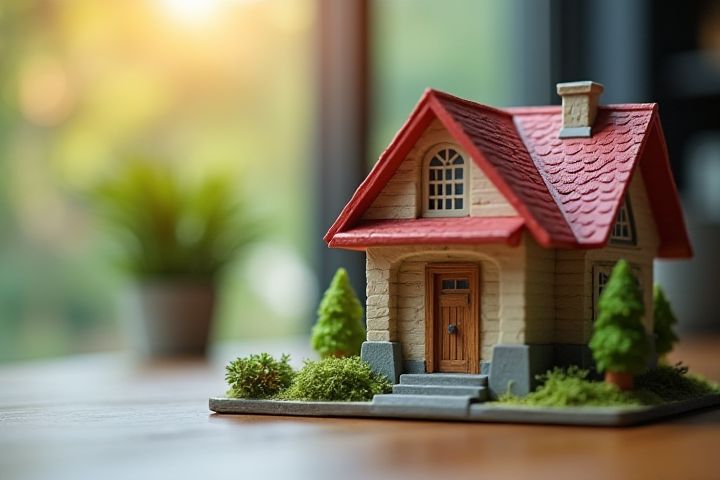
Renting your house for a short term is an excellent way to generate additional income, especially in popular tourist destinations or during major events. You should consider local regulations and zoning laws, which can vary widely by city or neighborhood, to ensure compliance with short-term rental requirements. Create an inviting and clean space by furnishing your home with essential amenities, as these factors can significantly influence guest satisfaction and positive reviews. Popular platforms like Airbnb and Vrbo provide a user-friendly interface for listing your property and managing bookings, allowing you to reach a wide audience. Finally, invest in quality photography and write appealing descriptions to showcase your home's unique features and attract potential renters.
Can I Rent My House For A Short Term
Local zoning laws
Local zoning laws significantly influence the ability to rent your house for short-term stays. Many municipalities designate specific zones for short-term rentals, typically requiring registration or permits to operate legally. Violations of these regulations can result in fines, penalties, or even the revocation of rental privileges. Before listing your property on platforms like Airbnb or Vrbo, ensure you understand the unique zoning laws that apply to your area to avoid potential legal issues.
Short-term rental regulations
Short-term rental regulations vary significantly by location, with numerous cities implementing laws to govern properties rented for less than 30 days. In many areas, you may need to obtain a license or permit, with some cities limiting rentals to a certain number of nights per year--often around 90 nights. Compliance with local zoning laws and health and safety requirements is essential, as failure to adhere can result in fines or eviction from rental platforms. Always check your local regulations to ensure you're meeting all legal obligations before listing your property for short-term rental.
Homeowner association rules
When renting your house for short-term stays, it's crucial to understand the Homeowner Association (HOA) rules governing your community. Many HOAs have specific regulations regarding short-term rentals, which may include restrictions on the minimum lease duration or requirements for obtaining permission. Violating these rules can result in fines or legal actions from the HOA, so reviewing your association's bylaws is essential. By ensuring compliance with these guidelines, you can enjoy the benefits of short-term rentals while maintaining a good relationship with your neighbors and association.
Tax implications
Renting your house for short-term use can lead to various tax implications that you should consider. Generally, rental income is taxable, meaning you must report any earnings on your tax return. However, if you rent out your property for 14 days or fewer within a year, the IRS allows you to exclude that income, provided you use the home for personal purposes for more than the rental period. Keep in mind, expenses related to the rental--like maintenance and property management fees--may be deductible, which can help offset your taxable income.
Insurance coverage
Renting your house for short-term stays can be lucrative, but it's crucial to understand the insurance implications. Many standard homeowners' policies do not cover short-term rentals, exposing you to potential liabilities. Ensuring you obtain a specialized short-term rental insurance policy can safeguard your property and provide coverage for guest injuries, property damage, and other liabilities. Research local regulations and check with your insurance provider to find the best coverage tailored to your short-term rental needs.
Property management requirements
Renting your house for short-term stays involves understanding various property management requirements. Ensure compliance with local zoning laws and short-term rental regulations to avoid fines. You should also consider acquiring necessary permits or licenses, as these are often mandatory in many jurisdictions. Proper property management systems, like booking platforms and maintenance scheduling, can enhance guest experience and streamline operations, maximizing your rental income.
Rental platform compliance
Before renting your house on a short-term basis, ensure compliance with local regulations and rental platform policies. Many areas require specific permits, adherence to zoning laws, and compliance with safety standards. Platforms like Airbnb or VRBO often have guidelines about maximum occupancy and insurance requirements, which you must follow to avoid penalties. Familiarizing yourself with these regulations can help you optimize your rental income while ensuring a smooth hosting experience for you and your guests.
Health and safety standards
Renting your house for short-term stays requires strict adherence to health and safety standards to ensure your guests' well-being. Ensure your property is compliant with local regulations, which may include smoke detectors, carbon monoxide alarms, and fire extinguishers in place and functioning. Regularly inspect and sanitize high-touch surfaces, such as doorknobs and light switches, to reduce the risk of contagions, especially during flu season or pandemic situations. Additionally, provide clear guidelines for waste disposal and encourage environmentally friendly practices to create a responsible rental experience that aligns with your community's health objectives.
Lease agreement details
When renting your house for short-term stays, it's crucial to draft a clear lease agreement that outlines specific details, including the rental period, payment terms, and security deposit amounts. Your lease should explicitly state the total rental price and any additional fees, such as cleaning or service charges, to avoid misunderstandings. Make sure to include house rules and guidelines, covering noise restrictions and occupancy limits, to ensure a pleasant experience for both you and your tenants. Finally, consider adding a cancellation policy, detailing the terms under which refunds will be issued, to protect both parties in case of unforeseen circumstances.
Market demand and pricing
Renting your house for short-term stays can be a lucrative venture, especially in high-demand areas. In cities with significant tourism, rental prices can range from $100 to over $300 per night, depending on local events, seasonality, and property amenities. Researching platforms like Airbnb or VRBO can help you understand market trends and optimize your pricing based on competitor listings. Staying informed on local regulations is crucial, as many regions have specific laws governing short-term rentals that can impact your rental strategy.
